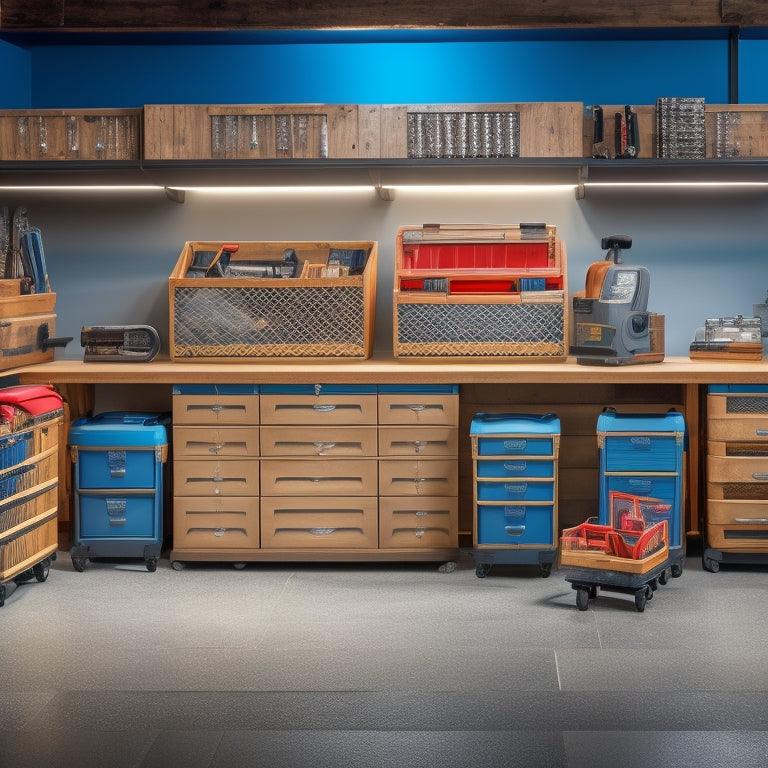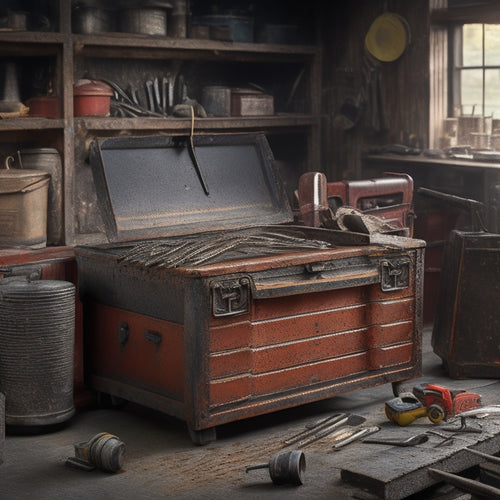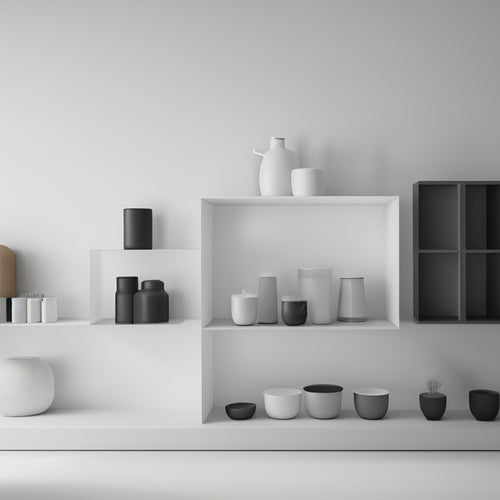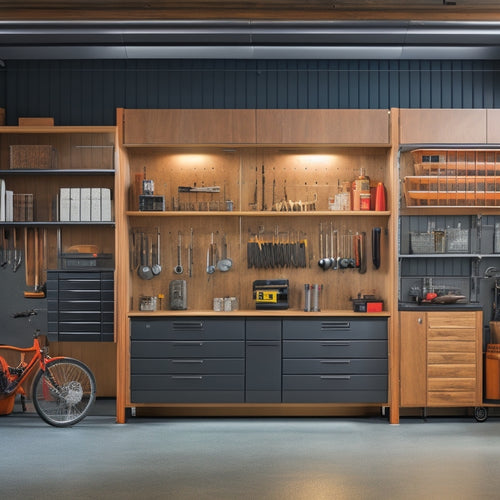
Portable Rolling Tool Box Options for the Modern Handyman
Share
As a modern handyman, you need a portable rolling tool box that combines durability, mobility, and organization. Top brands like DeWalt, Milwaukee, and Bosch offer heavy-duty polypropylene construction, telescoping handles, and customizable compartments. When selecting a toolbox, prioritize ergonomic design, security features, and durability. Consider the size and capacity that suits your needs, balancing portability with storage space. Look for toolboxes with adjustable dividers, removable trays, and weatherproof seals for efficient tool access. By choosing the right portable rolling tool box, you'll enhance your productivity and take your trade to the next level - and there's more to investigate to find the perfect fit.
Key Takeaways
- DeWalt, Milwaukee, and Bosch are top brands for rolling tool boxes, offering durability, portability, and organization.
- Ergonomic design, security features, and durability are key considerations when selecting a portable rolling tool box.
- Toolbox size and capacity should be balanced with portability, considering weight, storage space, and adjustable compartments.
- Material durability and build quality are crucial, with corrosion-resistant materials, impact resistance, and maintenance tips ensuring longevity.
- Premium features like telescoping handles, adjustable dividers, and pegboard panels enhance organization, accessibility, and overall productivity.
Top Brands for Rolling Tool Boxes
When shopping for a portable rolling tool box, you're likely to come across a multitude of brands, each touting their own unique features and benefits.
To help you make an informed decision, it's crucial to compare leading brands and their products.
DeWalt, Milwaukee, and Bosch are well-established brands that offer high-quality rolling tool boxes. DeWalt's line of tool boxes boasts heavy-duty polypropylene construction, ensuring durability and resistance to corrosion.
Milwaukee's tool boxes, on the other hand, focus on mobility and ergonomics, with telescoping handles and rugged wheels. Bosch's products prioritize organization, with customizable compartments and dividers.
When comparing these brands, you'll notice distinct differences in their main features. DeWalt excels in storage capacity, while Milwaukee shines regarding portability.
Bosch, meanwhile, stands out for its attention to detail concerning organization. By understanding these brand comparisons, you can determine which rolling tool box best suits your specific needs and preferences.
Key Features to Consider
Now that you've narrowed down your options by considering top brands, it's time to focus on the key features that'll make a portable rolling tool box suitable for your needs.
As a handyman, you require a toolbox that's not only functional but also safe and comfortable to use.
When evaluating portable rolling tool boxes, consider the following essential features:
-
Ergonomic design: Look for a toolbox with a comfortable, cushioned handle that reduces fatigue and strain on your hands and back. This feature is vital for extended use.
-
Security features: Confirm the toolbox has sturdy locks or latches to prevent unauthorized access and protect your precious tools.
-
Durability and weather resistance: A portable rolling tool box should be built with resilient materials that can withstand harsh weather conditions and rough job sites.
- Organizational compartments: Opt for a toolbox with well-organized compartments and dividers to keep your tools tidy and easily accessible.
Toolbox Size and Capacity Matters
Your toolbox's size and capacity are critical factors in determining its portability and functionality. When selecting a portable rolling tool box, it's crucial to take into account the toolbox dimensions and capacity considerations that meet your specific needs.
A larger toolbox may provide more storage space, but it can also increase the weight and decrease portability. On the other hand, a smaller toolbox may be more portable but may not hold all the tools you need.
Measure the space where you plan to store the toolbox and take into account the size of the tools you need to carry. Toolbox dimensions typically range from 18 to 40 inches in length, 8 to 20 inches in width, and 8 to 16 inches in height.
Capacity considerations include the weight limit, number of compartments, and organizational features. Look for a toolbox with adjustable dividers, removable trays, and a sturdy handle to guarantee easy transport and access to your tools.
Material Durability and Build Quality
The toolbox's material durability and build quality greatly impact its ability to withstand the rigors of daily use and harsh environmental conditions. As you consider your portable rolling tool box options, it's crucial to evaluate the material selection, impact resistance, and weatherproof coatings that guarantee your tools remain protected.
When evaluating build quality, look for the following key features:
- Corrosion-resistant materials that prevent rust and damage from moisture exposure.
- Ergonomic design that distributes weight evenly, reducing fatigue and strain when transporting the toolbox.
- Impact-resistant corners and reinforced edges that absorb shocks and drops, protecting your tools from damage.
- Weatherproof seals and coatings that prevent water and dust from entering the toolbox, ensuring your tools remain dry and functional.
Additionally, consider maintenance tips, such as regularly cleaning and lubricating moving parts, to extend the lifespan of your toolbox.
Finally, review warranty options and manufacturer support to guarantee you're protected in case of defects or malfunctions.
Mobility and Portability Options
Most portable rolling tool boxes are designed to be moved around frequently, making mobility and portability vital aspects to contemplate. As you evaluate your options, consider the wheeled convenience of each model.
Look for tool boxes with sturdy, heavy-duty wheels that can withstand rough terrain and frequent use. You'll also want to confirm the wheels are securely attached to the box to prevent them from coming loose during transport.
When it comes to portability, an ergonomic design is essential. A comfortable, cushioned grip will reduce fatigue and make it easier to maneuver the tool box around the job site.
Additionally, consider the overall weight and balance of the tool box. A well-balanced design will make it easier to lift and move, reducing the risk of accidents and injuries.
Organizational Systems and Compartments
With your portable rolling tool box in motion, you're now ready to focus on what's inside - the organizational systems and compartments that keep your tools and supplies within easy reach.
A well-designed compartment organization system is essential for efficient tool accessibility, ensuring you can quickly find what you need without wasting time or risking injury.
Consider the following features to optimize your tool box's internal layout:
-
Adjustable dividers: Customize compartments to fit tools of various sizes, maximizing storage capacity and preventing clutter.
-
Pegboard panels: Hang frequently used tools, such as hammers and screwdrivers, for instant access and reduced fatigue.
-
Small parts trays: Store tiny items like nuts, bolts, and screws in designated trays to prevent loss and misplacement.
- Deeper storage bins: Reserve larger compartments for bulkier items, like power tools and equipment, keeping them organized and out of the way.
Budget-Friendly Portable Toolboxes
When you're on a tight budget, finding an affordable portable toolbox that meets your needs is essential.
You'll want to look for space-saving designs that maximize storage capacity without breaking the bank.
Opting for durable yet lightweight materials will also help you strike a balance between cost and performance.
Affordable Toolbox Options
You're in the market for a portable rolling tool box that won't break the bank. Fortunately, there are several affordable options available that cater to the modern handyman.
These budget-friendly toolboxes offer compact storage options, perfect for DIY projects and small-scale renovations.
Here are some key features to look for in an affordable toolbox:
-
Durable construction: A sturdy frame and rust-resistant materials guarantee your tools stay protected and organized.
-
Compact design: Look for toolboxes with a small footprint, making them easy to store in tight spaces.
-
Multiple compartments: Separate storage areas keep tools organized and within reach.
- Easy mobility: Wheels or handles allow for easy transportation, reducing fatigue and increasing productivity.
When selecting an affordable toolbox, consider your specific needs and the types of projects you'll be working on.
Space-Saving Designs Matter
Frequently, DIY enthusiasts and professionals alike find themselves working in cramped spaces, where every inch counts. When you're working in tight quarters, compact storage becomes essential. That's why space-saving designs matter when it comes to portable rolling tool boxes. You need a toolbox that can efficiently organize your tools without taking up too much space.
Look for a toolbox with a clever design that maximizes storage capacity while minimizing its footprint. Consider a toolbox with stacked trays, removable dividers, and adjustable compartments. These features enable you to customize the storage layout to fit your specific needs.
With efficient organization, you'll be able to quickly find the tool you need, even in a small workspace.
When evaluating portable rolling tool boxes, prioritize compact storage and efficient organization. A well-designed toolbox will help you stay organized, reduce clutter, and improve your overall productivity.
Durable Yet Lightweight
Opt for portable rolling tool boxes that strike a balance between durability and lightweight construction, guaranteeing you can transport your tools with ease without breaking the bank. This is especially important for handymen who need to move around job sites frequently.
By choosing a tool box that weighs less, you'll conserve energy and reduce the risk of strain or injury.
Here are some key features to look for in a durable yet lightweight portable tool box:
-
Lightweight materials: Look for tool boxes made from high-density polyethylene (HDPE) or other durable, lightweight materials that can withstand harsh job site conditions.
-
Ergonomic design: A tool box with an ergonomic design will fit comfortably in your hand or on your shoulder, reducing fatigue and discomfort during transport.
-
Reinforced frames: A sturdy frame will protect your tools from damage and guarantee the tool box remains intact even when subjected to rough handling.
- Compact size: A compact tool box takes up less space in your vehicle or on the job site, making it easier to maneuver and store.
Premium Rolling Tool Box Features
When upgrading to a premium rolling tool box, expect a slew of advanced features that enhance organization, accessibility, and durability. You'll appreciate the premium materials and innovative designs that provide a sturdy storage solution for your tools.
Here's a breakdown of some key features you can expect:
| Feature | Description |
|---|---|
| Telescoping Handle | Adjusts to fit your height and folds up for compact storage |
| Ball-Bearing Drawers | Smoothly glides open and closed, even when fully loaded |
| Integrated Power Station | Includes USB ports and power outlets to keep devices charged |
These premium features are crafted to make your work easier and more efficient. With a premium rolling tool box, you'll spend less time searching for tools and more time getting the job done. Plus, the durable construction and weather-resistant materials guarantee your tools are protected from the elements. By investing in a premium rolling tool box, you're investing in your own productivity and safety on the job site.
Best Toolbox for Specific Trades
You're likely to require a toolbox that caters specifically to your trade, so it's crucial to identify the must-haves for your profession.
For electricians, this means compartments for wire, pliers, and multimeters, while plumbers need space for pipe cutters, wrenches, and drain snakes.
Depending on your specialty, a toolbox that's customized to your needs will make your workflow more efficient.
Electrician's Toolbox Essentials
As electricians maneuver through various job sites, they require a toolbox that's customized to their specific needs, equipped with the right tools to tackle complex electrical tasks efficiently.
You need a toolbox that's organized, accessible, and stocked with the essentials to get the job done safely and effectively.
Here's what you should consider including in your electrician's toolbox:
-
Multimeter: A digital multimeter is a must-have for measuring voltage, current, and resistance in electrical circuits.
-
Wire strippers: A good pair of wire strippers is essential for stripping insulation from electrical wires.
-
Pliers and screwdrivers: A set of pliers and screwdrivers in various sizes and types (e.g., needle-nose, flathead, Phillips) will help you grip and turn objects with precision.
- Safety equipment: Don't forget to include essential safety gear like gloves, safety glasses, and a first aid kit to protect yourself from electrical shock and other hazards.
With these power tools and safety equipment at your fingertips, you'll be well-equipped to handle a variety of electrical tasks and guarantee a safe working environment.
Plumber's Perfect Companion
A plumber's toolbox is more than just a container for tools - it's a strategic partner in tackling complex piping and drainage tasks efficiently. You need a toolbox that's specifically designed to hold all your plumbing essentials, from wrenches and pliers to pipes and fittings.
Look for a portable rolling tool box with compartments and dividers to keep your tools organized and within easy reach. This will save you time and reduce the risk of accidents caused by clutter.
When choosing a toolbox, consider the material and durability. A waterproof and rust-resistant toolbox will protect your tools from harsh job site conditions.
You should also prioritize tool maintenance; a toolbox with built-in tool holders and a removable tray will make cleaning and organizing your tools a breeze.
Additionally, consider a toolbox with a built-in charging station to keep your power tools charged and ready to go.
With the right toolbox, you'll be able to tackle even the most complex plumbing tasks with confidence and precision.
Carpenter's Must-Haves
The carpenter's toolbox is a carefully curated arsenal of precision instruments, each selected to tackle specific tasks with ease and efficiency.
As a carpenter, you understand the importance of having the right tools for the job, and a portable rolling tool box is an essential part of your arsenal. With a well-stocked toolbox, you can tackle a wide range of carpentry techniques, from framing to finishing.
Here are some must-haves for your carpenter's toolbox:
-
Tape measure: A 25-foot tape measure is a staple for any carpenter, allowing you to quickly and accurately measure materials and layouts.
-
Level: A level guarantees that your work is precise and plumb, whether you're hanging doors or installing cabinets.
-
Pliers and wrenches: A set of needle-nose pliers, slip-joint pliers, and adjustable wrenches will help you grip and twist objects with ease.
- Marking gauge: A marking gauge helps you make precise measurements and markings on materials, guaranteeing accuracy in your cuts and joints.
Frequently Asked Questions
Can I Attach a Portable Toolbox to My Workbench or Truck?
You can attach a portable toolbox to your workbench or truck, but verify the toolbox attachment is compatible with your workbench's dimensions and material, and securely fasten it to prevent accidents.
How Do I Clean and Maintain My Rolling Tool Box?
Did you know 70% of toolbox-related injuries occur due to poor organization? You'll avoid becoming a statistic by implementing toolbox organization strategies, like categorizing tools and labeling compartments, and maintenance tips, such as regular cleaning and lubricating hinges and wheels.
Are Portable Toolboxes Suitable for Outdoor or Harsh Environments?
When working outdoors, you'll want a portable toolbox with durability features like rust-resistant coatings, waterproof seals, and UV-stable materials to guarantee weather resistance, keeping your tools protected from harsh environments and extreme temperatures.
Can I Customize the Compartments and Layout of My Toolbox?
"Measure twice, cut once" is sage advice when customizing your toolbox. You can tailor the compartment organization and layout flexibility to fit your unique needs, ensuring a precise fit for your tools and ideal workflow.
Do Portable Toolboxes Come With a Warranty or Guarantee?
You'll find that many manufacturers offer various warranty types, such as limited lifetime or 5-year warranties, and guarantee policies that cover defects, repairs, or replacements, providing you with peace of mind and protection for your investment.
Conclusion
You've traversed the vast terrain of portable rolling tool box options, and now it's time to forge your path. Like Odysseus returning home, you've weathered the storms of research and emerged victorious. With your trusty toolbox by your side, you're ready to tackle any project that comes your way. Remember, a good toolbox is like a right-hand man - it's got your back, keeps you organized, and helps you get the job done efficiently. Choose wisely, and your toolbox will be your constant companion on the expedition to becoming a skilled artisan.
Related Posts
-

Maximum Capacity Tool Boxes for Heavy-Duty Use
You need a maximum capacity tool box that can withstand the rigors of heavy-duty use, protecting your essential tools...
-

Small Shelving Options for Tight Spaces
You're surrounded by tight spaces in your home, and you need clever shelving solutions that optimize storage without ...
-

Best Materials for Garage Wall-Mounted Cabinets
When selecting materials for your garage wall-mounted cabinets, you'll want to evaluate options that balance durabili...


